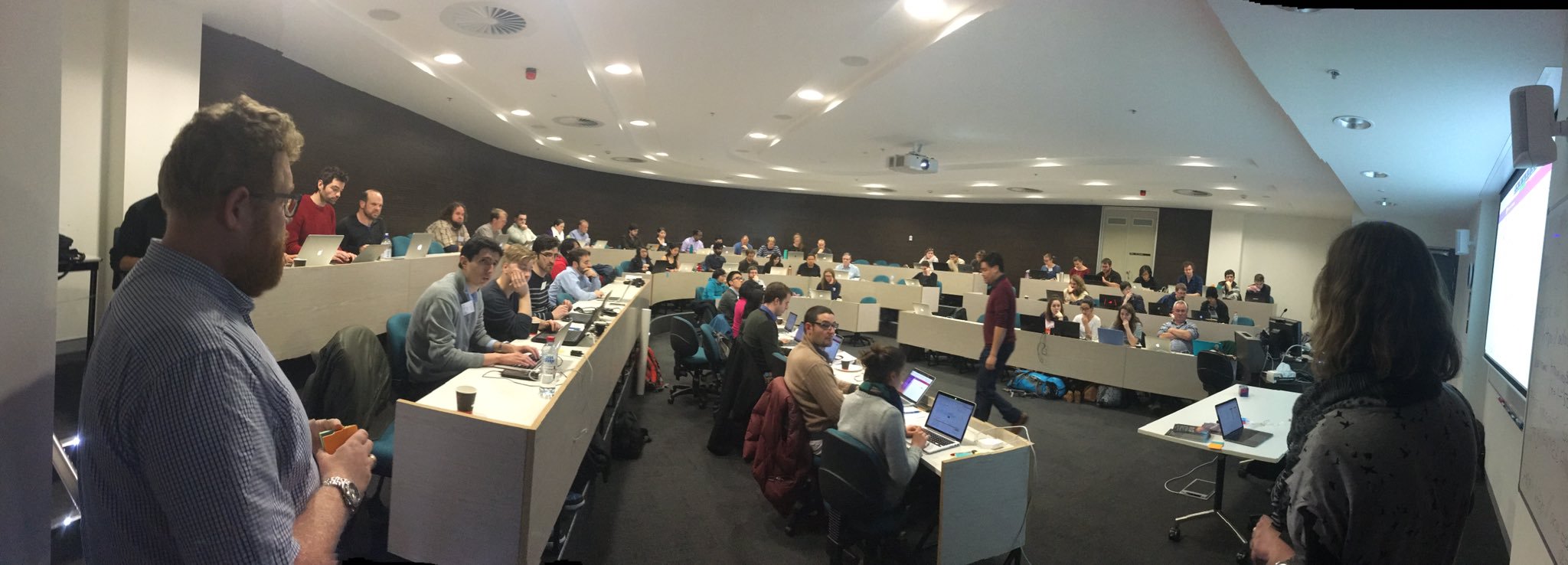TRAINING SERVICES
Our skills, expertise, and offerings
Comprehensive and well taught computational training is paramount for the astronomy community to harness the potential of the next generation telescopes and astronomy simulations. In the era of big telescopes and big data, data analysis practices need to scale to the volume of data processing and analysis needed for researchers to compete in a world-class arena.
Many undergraduate and postgraduate degrees in physics and astronomy do not offer modules on computing and current computational advancement, hence researchers at any level are mostly self-taught programmers. This proves to be a major problem when rigorous computational methods are required to ensure efficient and consistent processing and analysis of data.
Training provided by ADACS aims to teach astronomers important basic computing practices, as well as offer them content on new computational advances that could prove to be vital in future data analysis.
Our main streams of delivery are face-to-face and online. Please have a look at the respective pages to learn more and connect with the content.
Our youtube channel (ADACS learning) makes a selection of our LMS webinars available to the public.
Material we teach during these workshops is generally made available via our Github page
ADACS runs regular internships offering student the possibility to work on software development projects within astronomy
A curated list of tutorials,information and cheat sheets from around the web on key skills for astronomy researchers that are not explicitly covered in our webinars.
Astronomer Skills Profile
Learning materials are plentifully available on the internet. However, as astronomers, you may find that your set of required skills is rather eclectic.
We collected information from astronomers at various career stages and from a number of fields to determine what the skills and tools are they most commonly use in their career, with the aim to map out the associated learner journey.
Below you can find the skill sets we found based on computational skills that are discipline independent and astronomer profiles applicable to particular fields.
If you want to help us build up these skill profiles and map out the learner journeys, please consider filling out our survey. Participation in this survey is completely voluntary and confidential. No personal data will be shared. However, the outcome of this survey, i.e., the skills tree and learner journey, will be made available via the ADACS webpage.
Core Skills
Beginner
You are able to run simple scripts, make basic plots and navigate using commands in a terminal.
Intermediate
At this stage, you can set up environments with ease, query databases apply statistical tests, bootstrap data and write your own library of functions.
Advanced
You are familiar with parallelization, can use Emcee processes and have worked with machine learning code and programs such as Keras/sklearn or TensorFlow.
Beginner
As a beginner, you should be familiar with version control principals and be able to implement it locally.
Intermediate
At this stage, you will use remote version control as well as be familiar with creating/branching/forking repositories.
Advanced
Advanced topics include confidently working in collaborative repos, which includes dealing with pull requests as well as merge conflicts.
Beginner
As a beginner, you should be familiar with the command line and you are able to commit jobs to the queue. Furthermore, you can check on the state of your jobs and load modules.
Intermediate
At this stage, you should be able to run jobs interactively and parallelize code.
Advanced
Advanced topics include HPC resource management optimization (time/memory) and being able to compile and run MPI jobs.
Beginner
As a beginner, you should be familiar with finding key information in scientific papers, able to effectively use LaTeX and have the knowledge to produce good quality presentations and slides.
Intermediate
At this stage, you will be able to effectively manage papers you have read and bibliographies, and are able to tailor presentations to the knowledge base of your audience. Furthermore, you are able to estimate and manage time for projects successfully.
Advanced
Advanced topics include advising students with their projects and knowing how to give constructive feedback. You are able to plan and manage projects and are able to work in a collaborative team.








